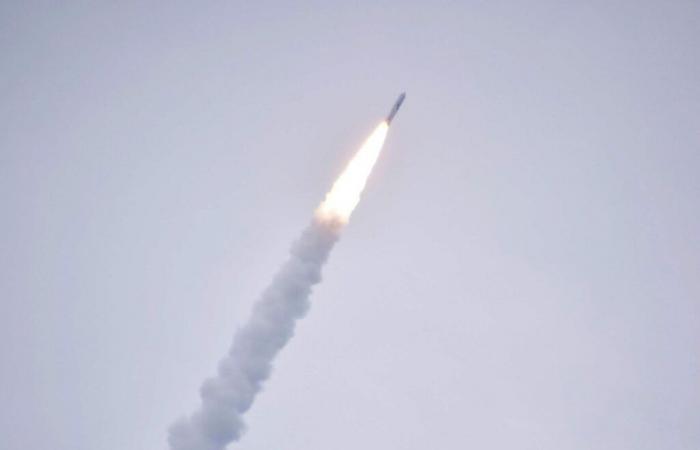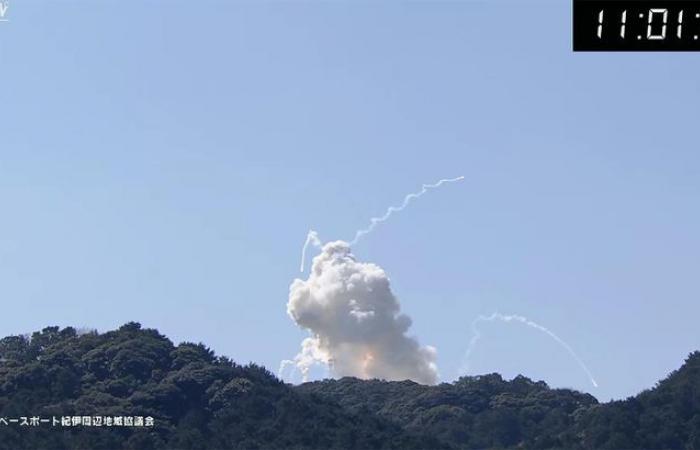The Japanese space program experienced another hitch on Tuesday, when a major fire broke out during engine tests on a solid fuel Epsilon S rocket in the south of the archipelago, apparently without causing any injuries.
Fireballs and white smoke rose into the sky from the Tanegashima launch base, according to spectacular images broadcast by public broadcaster NHK.
“There was an anomaly during today’s combustion test”declared the Japanese Space Agency (Jaxa) shortly after in a press release sent to AFP.
“No injuries have been reported at this time. The causes (of the incident) are also under investigation”she added.
Journalists stationed about 900 meters from the site reported a large explosion 30 seconds after the start of the combustion test at 8:30 a.m. local time (11:30 p.m. GMT Monday). What appeared to be a burning object flew toward the sea, according to NHK.
At the end of the day, Jaxa indicated that the reasons for the incident remained for the time being. “unknown”.
The space agency will need “at least a few months” to identify the cause, take countermeasures and, if necessary, carry out another combustion test, project leader Takayuki Imoto told reporters.
Enough to hamper the planned schedule: the Japanese daily Asahi reports that Jaxa’s plan to launch the Epsilon S rocket, which succeeds the Epsilon, by next March now seems almost impossible.
The episode will have an impact “significant” on the mission schedule, Mr. Imoto simply admitted.
Successes and pitfalls
The space agency, which succeeded last January in landing an unmanned probe on the moon, making Japan only the fifth country to achieve such a feat, has however suffered several setbacks in recent years in its rocket programs.
In July 2023, an Epsilon S engine exploded during a test, approximately 50 seconds after ignition.
“With the Epsilon S, rocket development is extremely important for the independence of Japan’s space development program”declared Tuesday the spokesperson for the Japanese government, Yoshimasa Hayashi.
The H3 rocket takes off from the Tanegashima Space Center, in southwest Japan, on March 7, 2023 / STR / JIJI Press/AFP
Jaxa managed to launch the H3 last February, its new flagship rocket intended to allow Japan to compete in particular with the Falcon 9 from the American SpaceX.
But this attempt followed a failure in February 2023, when the machine co-developed with the Japanese group Mitsubishi Heavy Industries (MHI) was unable to take off due to a problem with the ignition of its boosters.
Then, during a second attempt in March 2023, the rocket initially successfully took off, before deviating from its trajectory due to a failure of the second stage engines. The Jaxa had been forced to destroy it in mid-flight.
Since these setbacks suffered last year, “we have done everything we can to identify what went wrong (…) We regret that (an incident) has occurred again”reacted Takayuki Imoto Monday evening.
Image broadcast by AFPTV from an online video from Wakayama Telecasting Corp. (WTV), March 13, 2024, showing the explosion of a rocket after its launch by Japanese startup Space One from the Kii Peninsula, Kushimoto, Wakayama Prefecture / – / AFP
A rocket from a private Japanese company also exploded in March 2024, a few seconds after its launch.
Baptized “Kairos” and 18 meters high, this solid fuel rocket from the start-up Space One, based in Tokyo, took off with a small satellite from the Japanese government on board.
But seconds after launch, the rocket turned into a ball of fire, with thick smoke filling the launch site and flaming debris from the craft falling onto the surrounding slopes.
Following the announcement of the fire on Tuesday at the Tanegashima base, Mitsubishi Heavy Industries (MHI) fell 3.27% on Tuesday on the Tokyo Stock Exchange, while the title of Japanese jet manufacturer IHI dropped almost 5%.







